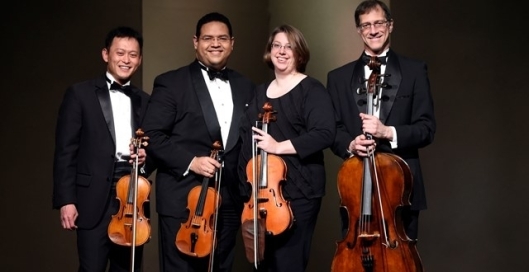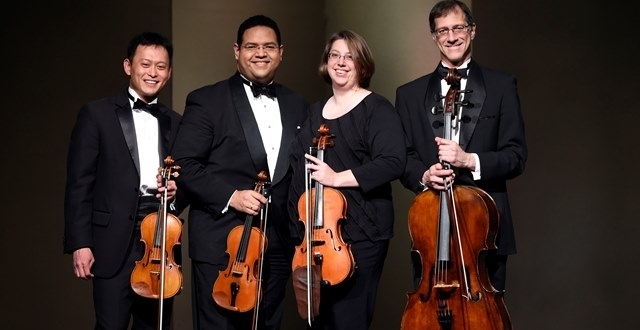
Sunday’s cool weather, still a bit damp around the edges, seemed to soften the brilliance of the day, gently blurring out the hard angles of autumn sun against a perfect blue sky. Given the almost painterly atmosphere, it was hard not to feel optimistic and upbeat strolling around downtown, feelings that were most definitely at odds with the intended emotional context of Sunday afternoon’s program by the KSO Principal Quartet at the Bijou. Two of the three works on the quartet’s bill—Shostakovich’s String Quartet No. 8 in C minor and Beethoven’s String Quartet No. 15 in A minor, op. 132—would undoubtedly have benefited by a gray, drizzly day, perhaps with a few low rumbles of thunder, that would have served to focus our moods towards a suitable level of anguish or melancholy.
As a result, perception battled reality for the afternoon. Shostakovich wrote his No. 8 quickly, in three days, while visiting Dresden in July 1960 for work on the music for a film about that city’s destruction in World War II. While the quartet was dedicated “in memory of the victims of Fascism and war,” Shostakovich probably had hidden motives, later making references to the work being autobiographical and alluding cryptically that he was a “victim” of the Soviet system. The KSO quartet gave the work an enjoyable sense of emotional and pointed angularity, while retaining a balance of tonal darkness on the lower end.
In the Beethoven which concluded the program, I had trouble latching onto the ensemble’s intent and focus in the two opening Allegro movements. However, everything converged beautifully in the third Andante movement, titled “A Convalescent’s Sacred Song of Thanks to the Deity, in the Lydian Mode,” and carried through to the end. The final three movements represented a solid performance that possessed moments of both sweet intimacy and bold strength, tied together, most importantly with a beautiful ensemble precision and subtly tuned balance.
This was my first hearing of the opening work, the programmatic Angelica from 1999, by the contemporary Venezuelan composer, Efrain Amaya. The short, but engaging, piece, based on the stories of legend surrounding Charlemagne (specifically the tale of Rinaldo, Orlando, and Angelica), was described through some clever melodic treatments and intriguing rhythms of a Latin American flavor.








